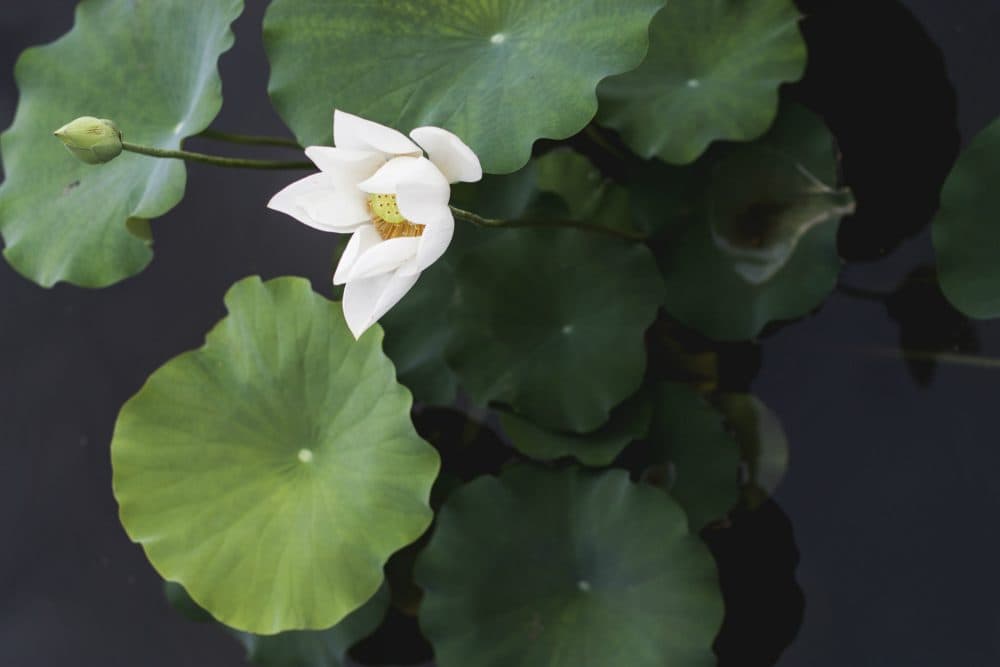Advertisement
Treacherous Beauty: Water Lilies As Harbingers Of Climate Change

As a child, I was fearless. Roller coaster rides were thrilling, not harrowing. Snakes grossed me out, but didn’t elicit the sort of primal terror that they do now. I climbed trees with mounting exhilaration, not anxiety, and the high branches signified freedom, never danger.
But there was one threat that my brother and cousins and I avoided during our idyllic summers at a rustic lake house in Quebec: water lilies.
Don’t go near them, our mothers warned. So although we were free to walk on our own the mile to and from the local post office that doubled as a candy store, though we were encouraged to swim across the lake and back, we kept our fearful distance from these placid green fronds floating near the shore. The pert white flowers erupting like starbursts screamed danger.
...we kept our fearful distance from these placid green fronds floating near the shore. The pert white flowers erupting like starbursts screamed danger.
Years later, I understood the rationale behind this injunction. Our next door neighbor in the country, one of my mother’s oldest friends, had contracted polio when she was 14 years old. She blamed it on swimming in stagnant water, the kind of water in which water lilies flourish. It wasn’t the plants themselves that were harmful, just the conditions in which they prospered.
Lately, I’ve been dogged by the memory of our near-panicked response to these lovely, innocuous flowers, and I’ve finally figured out why: Water lilies thrive not just in stagnant waters, but in warming ones. And this summer, the hottest on record, they bloomed with abandon.
For the first time in my life I’m feeling immediately, viscerally afraid about the future of our planet. As we see Louisianans struggle with massive flooding and see forecasts of a rapid-fire series of tropical rainstorms and hurricanes, I worry about storms achieving a new level of violence and heat waves that kill on a massive scale; about drought and freezing and mass migrations of displaced people to countries that will not welcome them. To my immense sadness, I realize that I regard the prospect of another grandchild with some ambivalence, wondering for the first time in my 62 years whether they’ll live in a sufficiently kind, habitable world.
My own feeble efforts to be more environmentally responsible don’t counteract my dread of what lies ahead for the next several generations. Dread, and roiling rage at the 34 percent of climate change deniers in Congress who are stupider, greedier or simply more bribable than children offered candy.
I don’t know how to manage this kind of fear. I can’t simply keep my distance from it or paddle away if I drift too close. There’s no vaccine for it, nor should there be. It is rational to feel alarmed about climate change, delusional not to be. I hate feeling afraid. I don’t want to be paralyzed, and the only way I know to overcome this corrosive fear is through action. It’s by calling out and throwing out of office those who lack the political will to take urgent measures to reduce our carbon emissions, however costly.
It is rational to feel alarmed about climate change, delusional not to be.
Meanwhile, I’ll let myself be inspired by the hordes of bike riders and mass transit riders who are abandoning cars. I'll be encouraged by the solar panels and wind turbines that are slowly dotting the landscape. And I'll be energized by the climate activists who are not surrendering to cynicism or despair.
And of course, I’ll find solace and epiphany in literature, in words like these, from the opening of D.H. Lawrence’s "Lady Chatterly’s Lover" -- with thanks to author Miriam Toews, in whose marvelous new novel I rediscovered them:
Ours is essentially a tragic age, so we refuse to take it tragically. The cataclysm has happened, we are among the ruins, we start to build up new little habitats, to have new little hopes. It is rather hard work: there is now no smooth road into the future: but we go round, or scramble over the obstacles. We've got to live, no matter how many skies have fallen.
